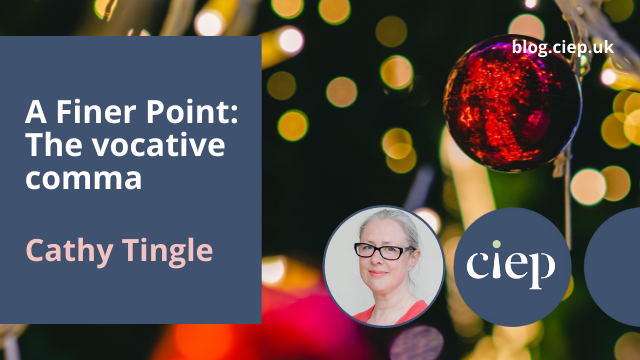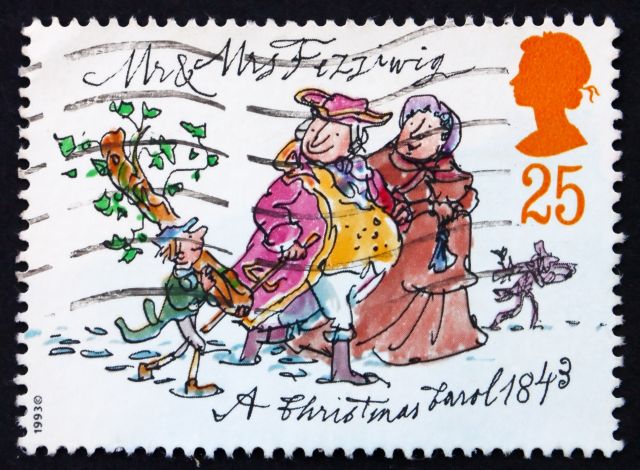Cathy Tingle updates a column of Christmas past for a festive reminder of what one kind of comma can teach us.
 As I am an editor, my favourite Christmas carol – obviously – is ‘God Rest You Merry, Gentlemen’ because of the vocative comma (the one before ‘Gentlemen’). This type of comma is particularly important in creative works, as I discovered a few years ago when I cast my eye over a friend’s unedited novel and encountered characters being addressed directly without this comma: ‘I really don’t know Marion’, ‘Did you see Marion?’ (Marion was the addressee in both) and ‘Trying to sober up Richard?’ (as Richard was asked at the end of a party). The meaning conveyed in each case is quite different from what the writer was intending, as in the old classic ‘Let’s eat Grandma’.
As I am an editor, my favourite Christmas carol – obviously – is ‘God Rest You Merry, Gentlemen’ because of the vocative comma (the one before ‘Gentlemen’). This type of comma is particularly important in creative works, as I discovered a few years ago when I cast my eye over a friend’s unedited novel and encountered characters being addressed directly without this comma: ‘I really don’t know Marion’, ‘Did you see Marion?’ (Marion was the addressee in both) and ‘Trying to sober up Richard?’ (as Richard was asked at the end of a party). The meaning conveyed in each case is quite different from what the writer was intending, as in the old classic ‘Let’s eat Grandma’.
A multitude of angels – sorry, angles
Commas cause most people who work with words to pause for thought now and then, and they can’t possibly be covered in one short column. Why? Because there is just so much to say. Larry Trask, in the Penguin Guide to Punctuation, divides the comma population firmly into four types: the listing comma, the joining comma, the gapping comma and bracketing commas. In his recent CIEP guide on punctuation Gerard M-F Hill takes on the brave task of simplifying Trask’s model, and consequently gives the comma ‘with minor exceptions … two functions in prose’: isolating and listing. But it takes an action-packed 22-page chapter to elaborate fully on these functions and their exceptions.
Elsewhere, John Seely, in the Oxford A–Z of Grammar and Punctuation, identifies seven roles for commas if we omit their use in numbers. And The Chicago Manual of Style (17th edition) devotes sections 6.16–6.55 – that’s 40 sections – to them.
Even if we could square up these various ideas about how many uses commas have (and it’s tough: Fowler’s deals with this by following New Hart’s Rules), comma use is, according to David Crystal in Making a Point, sometimes simply a matter of taste, because it’s linked to psycholinguistics. ‘One person says, “I need a comma to make the meaning of this sentence clear”; another finds the same sentence perfectly understandable without a comma. It’s because they have different processing abilities.’
So, because things are hectic enough at this time of year, how about we look at just one type of comma, the vocative, which many experts including Seely and Trask don’t even cover directly? Who knows, it might tell us a small thing about commas in general.
Merry gentlemen, or not so much?
Back we go, then, to ‘God Rest You Merry, Gentlemen’. This is interesting because, of course, it’s often rendered as ‘God Rest You, Merry Gentlemen’, and indeed I spent my childhood picturing a group of jolly old chaps. (My friend Judith spent her childhood thinking that the lyrics included the words ‘to save us all from Santa’s power’ – it’s ‘Satan’s power’ – but that’s another story.)
In fact, ‘rest you merry’ used to be a recognised phrase, meaning ‘rest well, be happy’. Dickens, in A Christmas Carol (1843), actually changed the title to ‘God Bless You Merry Gentleman’, in the words of a boy singing outside Scrooge’s door. There’s no comma at all in my 1946 edition, which isn’t to say Dickens didn’t put one in the original, but the point is that he made ‘God Bless You’ the unbreakable phrase in this line (and those who punctuate before ‘Merry’ are making ‘God Rest You’ the unbreakable phrase), whereas ‘God Rest You Merry’ is the title’s original unbreakable phrase and so the comma should follow that. As we wrote about this carol’s title in last year’s festive CIEP quiz, ‘if you’re interested in the impact of punctuation, it’s an interesting exercise to omit the vocative comma, then move it slowly up the sentence from the end, displaying its power to change meaning’. There you are – something to do once the presents are opened on Christmas Day.
‘“No punctuation” is the ultimate marker of semantic tightness’, as David Crystal says in Making a Point. Commas create breaks between words, to put it simply, and if there’s no comma we tend to read the words as one block. There’s something about the special confusion experienced in response to the lack of a vocative comma that makes you appreciate this fully.
If you’d like to further explore the comma nuances in ‘God Rest You Merry, Gentlemen’, complete with a cappella musical accompaniment, may I recommend to you a short video, new for the 2021 festive season, by RamsesThePigeon. It really is a gift.
No comma, no confusion
But what if the lack of a comma before a name doesn’t cause confusion? One thing the vocative comma has been suffering from is a sense that it has become non-essential in phrases like ‘Hi John’. Mignon Fogarty (Grammar Girl), in The Grammar Devotional, valiantly tries to explain why it’s necessary in such cases:
In Hi, John you are directly addressing John, which means the punctuation rules of direct address apply. From a comma-rules standpoint, Hi, John is no different from Thanks for coming, John or Wow, John, what were you thinking?
Yet the comma after ‘Hi’ is used less and less. In November 2019, Ellen Jovin of @grammartable lamented on Twitter: ‘If people I communicated with still used vocative commas after “hi,” I would have continued to use them. But they look at me as though I have three dangling participles if I even bring up such a thing.’ Are we losing the vocative comma in this formulation because there is very little scope for misunderstanding without it, as with 2019’s giddy pre-Covid inter-generational put-down ‘OK Boomer’? Whatever else you thought of it, and however you capitalise it, this phrase is certainly not punctuated. So perhaps we’re slowly discarding all punctuation except what’s absolutely necessary for comprehension.
A simple lesson
I still keep in touch with my high-school English teacher, now in his mid-80s, and as you might expect, along with the chat about how my kids and his grandkids are doing, occasionally punctuation comes up. In a letter in 2019, he said, ‘I used to try to teach various classes that punctuation was in many instances more important than spelling: I could make out that “ejog” (as I had to once) was meant to be “hedgehog” from the material round about, but if the punctuation was misplaced or non-existent the sense was lost.’ He continued by revealing his tried-and-tested example: ‘I tended to use “Stop Toby” (our dog) v. “Stop, Toby”.’ Well, then: perhaps the vocative comma can teach where no other comma types can reach. With my own vocative comma firmly in place, it only remains for me to wish you a lovely festive season, everyone.
An earlier version of this column was published in Editing Matters, Jan/Feb 2020. CIEP members can access all issues of Editing Matters in the archive.
Resources
The Chicago Manual of Style (2017). 17th edition. University of Chicago Press.
David Crystal (2016). Making a Point. Profile, 2016.
Charles Dickens. A Christmas Carol (1946); reprint Penguin 1984.
Mignon Fogarty (2009). The Grammar Devotional. St. Martin’s Press.
Fowler’s Dictionary of Modern English Usage, ed. by Jeremy Butterfield (2015). 4th edition. Oxford University Press.
Gerard M-F Hill (2021). ‘Punctuation: A guide for editors and proofreaders.’ CIEP guide. ciep.uk/resources/guides/#PEP
New Hart’s Rules (2014). Oxford University Press.
RamsesThePigeon. ‘Where Is the Comma in “God Rest Ye Merry, Gentlemen” Supposed to Go?’ YouTube video. youtube.com/watch?v=sxfxy-3dGz0
John Seely (2020). Oxford A–Z of Grammar and Punctuation. Oxford University Press.
RL Trask (1997). Penguin Guide to Punctuation. Penguin.
 About the CIEP
About the CIEP
The Chartered Institute of Editing and Proofreading (CIEP) is a non-profit body promoting excellence in English language editing. We set and demonstrate editorial standards, and we are a community, training hub and support network for editorial professionals – the people who work to make text accurate, clear and fit for purpose.
Find out more about:
Posted by Abi Saffrey, CIEP blog coordinator.
The views expressed here do not necessarily reflect those of the CIEP.

